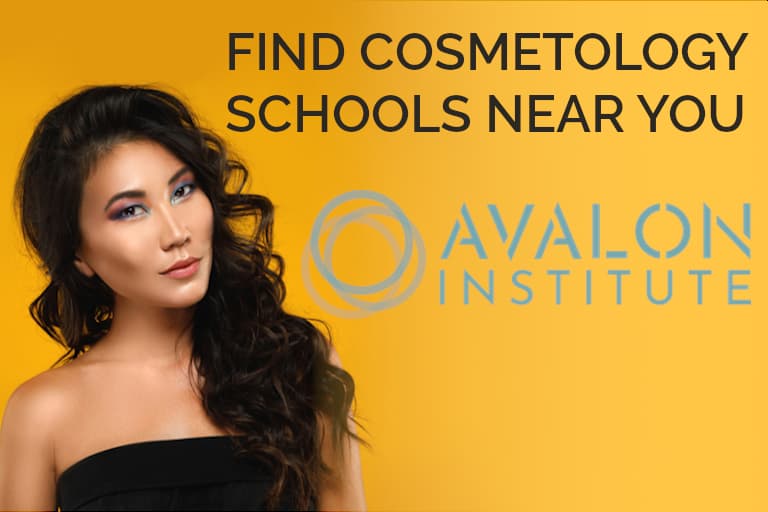Esthetician School Resource Hub
Welcome to the Esthetician School Resource Hub, where you can get answers to some of the big questions that pop up when considering a career in esthetics. Here, you'll learn about the basic requirements for most esthetician schools, what to expect from these programs, and how to find the best esthetician school for you.

sponsored content, school availability varies by location

sponsored content, school availability varies by location

sponsored content, school availability varies by location

sponsored content, school availability varies by location

sponsored content, school availability varies by location

sponsored content, school availability varies by location
What Is an Esthetician School?
Esthetician school teaches all about skincare. Esthetics, also called "aesthetics" or, occasionally, "esthiology," is one of the fastest-growing fields in America. As more people focus on self-care and wellness, they're looking for professionals dedicated to helping them improve their skin. That's where esthetician school graduates come in!
Start Your Journey! Find an Esthetician School Near You
- Alabama
- Alaska
- Arizona
- Arkansas
- California
- Colorado
- Connecticut
- Delaware
- D.C.
- Florida
- Georgia
- Hawaii
- Idaho
- Illinois
- Indiana
- Iowa
- Kansas
- Kentucky
- Louisiana
- Maine
- Maryland
- Massachusetts
- Michigan
- Minnesota
- Mississippi
- Missouri
- Montana
- Nebraska
- Nevada
- New Hampshire
- New Jersey
- New Mexico
- New York
- North Carolina
- North Dakota
- Ohio
- Oklahoma
- Oregon
- Pennsylvania
- Rhode Island
- South Carolina
- South Dakota
- Tennessee
- Texas
- Utah
- Vermont
- Virginia
- Washington
- West Virginia
- Wisconsin
- Wyoming
Esthetician School Requirements
There are several prerequisites to becoming an esthetician. Education requirements vary by state, as do tuition costs, program length, training hours, exams, and other licensing requirements.
Most schools expect students to:
Some states may require an 8th-grade education and others may need you to be 17. An acceptable criminal record in one state may not be okay in another state. A few states have looser or no English requirements. So, check with your state's cosmetology board and your chosen program to see what you need to do.
What Is Esthetician School Like?
Esthetics training involves much more in-depth than simply learning about skincare. You should also learn about sanitation, human physiology, state laws, and business skills.
Esthetician school is a combination of theoretical knowledge and practical training. Students learn through classroom instruction and demonstrations before practicing their new skills on mannequins and then moving to real volunteers as they become comfortable with the tools and products.
Although most programs occur during the day, some offer evening and weekend classes. An esthetics student committing to a nearly full-time schedule may spend around 24 to 35 hours per week in and out of class, either studying or practicing esthetics.
Student Voices Series: Why I Became an Esthetician
What inspired me to pursue beauty as a career is seeing the way my services make people feel. There is no better joy than designing a look for someone and seeing them feel beautiful both inside and out. A traditional office setting does not seem to set my soul on fire like hands-on work and the connection that I make with clients.
–Abigail Nguyen (Haslet, TX)
What Do You Learn in Esthetician School?
Esthetician school offers training in various aspects of skincare and beauty treatments. The specific curriculum can vary by school and program, but here are some common topics and skills that students typically learn in esthetics school:
Expect your hands-on training to cover:
Depending on your state and school, you may learn about more—or fewer—topics. Some common but not as universal subjects include microneedling or identifying signs of abuse or neglect.
Do you enjoy skincare but want to go beyond that one piece of the beauty puzzle? Check out cosmetology school!
How Do I Know Which Esthetician School Is Right for Me?
Before you enroll in an esthetician school, make sure the program suits your goals and lifestyle. Attending esthetician school is a large commitment in terms of time, money, and effort.
When comparing esthetician schools, look for the following:
State Approval or Accreditation of Esthetics Schools
All approved schools must be recognized by the state in which they operate. A school that's not recognized by the state could put you at risk of having spent the money and getting nothing in return. Most states maintain a list of approved schools on their board websites.
Some schools are accredited in addition to being approved by the state. It's important to understand that state approval is different from accreditation. Not all state-approved schools are accredited, and that doesn't mean they're bad. Accreditation is an extensive and expensive process that not all schools can swing. However, there are major benefits to attending an accredited school, like knowing the school has undergone a rigorous review of educational quality by the accrediting agency and potentially having an easier time moving to a new state while keeping your license.
Some of the most common accreditation agencies in the beauty space include:
Program Reviews
Online student testimonials can help you determine if a program suits your needs. See how the program's reputation holds up over several online sources, such as Google reviews and Niche.com, and don't be afraid to contact the admissions team to ask questions or discuss your concerns.
That said, be smart when reading reviews! While overly glowing or majorly negative reviews may be more eye-catching, they could have ulterior motives. Look at the overall feelings more than anything else.
Research the School
Look at the school's published materials and for outside reviews and opinions. Most school catalogs and websites give program details, with vital information like tuition and fees, scholarships and other financial aid, job placement rates after graduation, and student-to-faculty ratios. Using these publications is an excellent place to start. Then, you can take your shortened list of schools and look for student reviews, relationships with nearby salons, what professionals or clients say about them online, and any other details.
Talk to Esthetician Graduates
No one knows whether a program is worth the price like its previous students. Speak to grads for first-hand advice and ask about the specialties that pique your interest.
Take a Tour
Visit the school in person if you can. Walk through the whole space, ensuring it meets state standards, seeing how students and teachers interact, and doing a general vibe check. If it meets your needs and feels like a good place for you, consider enrolling.
Talk to Enrollment Staff
Whether or not you are making a school visit, speak at length with the enrollment staff at any school you're considering. This is a good way to get all your questions answered and, again, do a gut check.
Esthetics programs are available at community colleges, independent esthetics schools, and cosmetology schools. A list of approved programs near you may be available on your state board of cosmetology or your state's education department websites. Alternatively, simply browse Beauty School Directory's comprehensive list of esthetician programs in your state.

sponsored content, school availability varies by location

sponsored content, school availability varies by location

sponsored content, school availability varies by location

sponsored content, school availability varies by location

sponsored content, school availability varies by location

sponsored content, school availability varies by location











